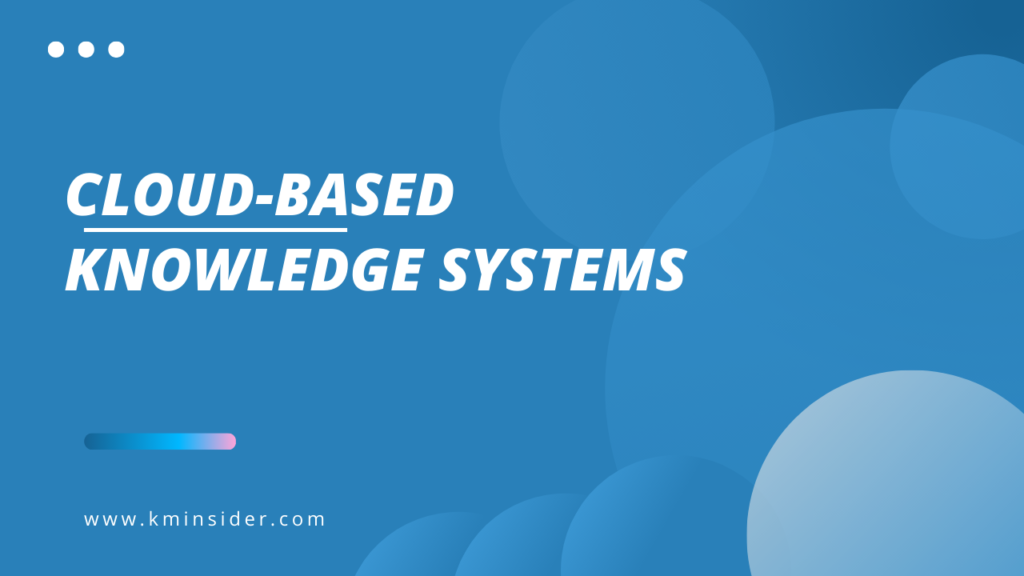Cloud-Based Knowledge Systems: In the fast-paced digital era, organizations are constantly seeking innovative solutions to streamline operations, foster collaboration, and optimize decision-making. Cloud-based knowledge management systems have emerged as a game-changer, offering unparalleled flexibility, scalability, and accessibility for businesses to harness their collective knowledge effectively. This article delves into the concept of cloud-based knowledge management systems, their key benefits, and how organizations can leverage them to achieve sustainable growth.

Understanding Cloud-Based Knowledge Management Systems
A cloud-based knowledge management system is an online platform that enables organizations to store, organize, and share valuable information and insights across various departments, locations, and devices. These systems utilize cloud technology, which means that data is securely stored on remote servers and can be accessed via the internet, anytime and anywhere. Key features of cloud-based knowledge management systems include:
- Centralized Storage: All organizational data is stored in a single, centralized repository, ensuring easy access and maintenance.
- Accessibility: Cloud-based systems can be accessed from any device with an internet connection, promoting collaboration and remote work.
- Scalability: Organizations can easily expand storage capacity or add new users as their business grows, without significant infrastructure investments.
- Data Security: Encryption, user authentication, and regular backups ensure that sensitive information remains protected.
Leveraging Cloud-Based Knowledge Management Systems for Business Success
Implementing a cloud-based knowledge management system can bring numerous advantages to organizations, including:
- Enhanced Collaboration: A centralized platform encourages team members to share ideas and insights, fostering a culture of innovation and productivity.
- Improved Decision-Making: Easy access to accurate, up-to-date information enables leaders to make well-informed decisions that drive growth and success.
- Streamlined Onboarding: New employees can quickly get up to speed by accessing relevant documents, policies, and training materials on the platform.
- Cost Savings: Cloud-based systems eliminate the need for expensive on-premises infrastructure, maintenance, and upgrades.
Selecting the Right Cloud-Based Knowledge Management Solution
To maximize the benefits of a cloud-based knowledge management system, it is essential to choose a solution that aligns with your organization’s unique needs and objectives. Consider the following factors when evaluating different platforms:
- Ease of Use: A user-friendly interface encourages employee adoption and ensures smooth integration with existing workflows.
- Customization: A system that can be tailored to fit your specific requirements will better support your unique business goals and processes.
- Security and Compliance: Ensure that the platform adheres to industry-standard security protocols and meets any necessary regulatory requirements.
In conclusion, cloud-based knowledge management systems are transforming the way organizations manage their intellectual assets. By offering seamless collaboration, improved decision-making capabilities, and significant cost savings, these platforms empower businesses to adapt and thrive in today’s dynamic digital environment.
FAQs
1. What is a cloud-based knowledge management system?
A cloud-based knowledge management system is an online platform that allows organizations to store, organize, and share valuable information and insights across various departments, locations, and devices using cloud technology.
2. How does a cloud-based knowledge management system improve collaboration?
A centralized platform enables employees to access, share, and update information in real-time, fostering communication, and innovation across the organization.
3. What are the cost benefits of implementing a cloud-based knowledge management system?
Cloud-based systems eliminate the need for expensive on-premises infrastructure, maintenance, and upgrades, resulting in significant cost savings.
4. How do I choose the right cloud-based knowledge management solution for my organization?
Evaluate platforms based on ease of use, customization options, and adherence to security protocols and regulatory requirements to find the best fit for your organization’s needs and objectives.
5. How do cloud-based knowledge management systems ensure data security?
Cloud-based knowledge management systems use encryption, user authentication, and regular backups to protect sensitive information stored on remote servers.
6. Can cloud-based knowledge management systems be accessed from any device?
Yes, one of the key features of these systems is their accessibility from any device with an internet connection, allowing for easy remote access and collaboration.
